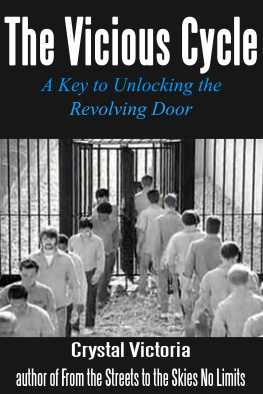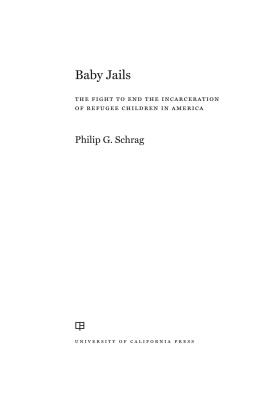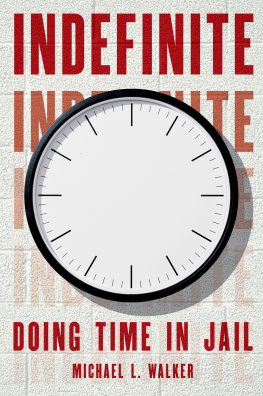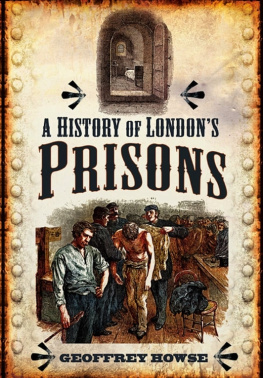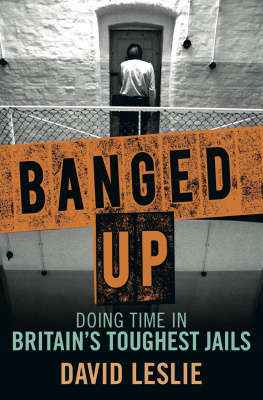Americas Jails
Alternative Criminology
General Editor: Jeff Ferrell
Pissing on Demand: Workplace Drug Testing and the Rise of the Detox Industry
Ken Tunnell
Empire of Scrounge: Inside the Urban Underground of Dumpster Diving, Trash Picking, and Street Scavenging
Jeff Ferrell
Prison, Inc.: A Convict Exposes Life inside a Private Prison
by K.C. Carceral, edited by Thomas J. Bernard
The Terrorist Identity: Explaining the Terrorist Threat
Michael P. Arena and Bruce A. Arrigo
Terrorism as Crime: From Oklahoma City to Al-Qaeda and Beyond
Mark S. Hamm
Our Bodies, Our Crimes: The Policing of Womens Reproduction in America
Jeanne Flavin
Graffiti Lives: Beyond the Tag in New Yorks Urban Underground
Gregory J. Snyder
Crimes of Dissent: Civil Disobedience, Criminal Justice, and the Politics of Conscience
Jarret S. Lovell
The Culture of Punishment: Prison, Society, and Spectacle
Michelle Brown
Who You Claim: Performing Gang Identity in School and on the Streets
Robert Garot
5 Grams: Crack Cocaine, Rap Music, and the War on Drugs
Dimitri A. Bogazianos
Judging Addicts: Drug Courts and Coercion in the Justice System
Rebecca Tiger
Courting Kids: Inside an Experimental Youth Court
Carla J. Barrett
The Spectacular Few: Prisoner Radicalization and the Evolving Terrorist Threat
Mark S. Hamm
Comic Book Crime: Truth, Justice, and the American Way
Nickie D. Phillips and Staci Strobl
The Securitization of Society: Crime, Risk, and Social Order
Marc Schuilenburg
Covered in Ink: Tattoos, Women, and the Politics of the Body
Beverly Yuen Thompson
Narrative Criminology: Understanding Stories of Crime
Edited by Lois Presser and Sveinung Sandberg
Progressive Punishment: Job Loss, Jail Growth and the Neoliberal Logic of Carceral Expansion
Judah Schept
Meth Wars: Police, Media, Power
Travis Linneman
Hacked: A Radical Approach to Hacker Culture and Crime
Kevin F. Steinmetz
The Gangs All Queer: The Lives of Gay Gang Members
Vanessa R. Panfil
Skateboarding LA: Inside Professional Street Skateboarding
Gregory J. Snyder
Americas Jails: The Search for Human Dignity in an Age of Mass Incarceration
Derek S. Jeffreys
Americas Jails
The Search for Human Dignity in an Age of Mass Incarceration
Derek S. Jeffreys
NEW YORK UNIVERSITY PRESS
New York
NEW YORK UNIVERSITY PRESS
New York
www.nyupress.org
2018 by New York University
All rights reserved
References to Internet websites (URLs) were accurate at the time of writing. Neither the author nor New York University Press is responsible for URLs that may have expired or changed since the manuscript was prepared.
Library of Congress Cataloging-in-Publication Data
Names: Jeffreys, Derek S., 1964 author.
Title: Americas jails : the search for human dignity in an age of mass incarceration / Derek S. Jeffreys.
Other titles: Alternative criminology series.
Description: New York : New York University Press, [2018] | Series: Alternative criminology | Also available as an ebook. | Includes bibliographical references and index.
Identifiers: LCCN 2017034397 | ISBN 978-1-4798-3862-2 (cl ; alk. paper) | ISBN 1-4798-3862-4 (cl ; alk. paper) | ISBN 978-1-4798-1482-4 (pb ; alk. paper) | ISBN 1-4798-1482-2 (pb ; alk. paper)
Subjects: LCSH : JailsUnited States. | Dignity. | PrisonersAbuse ofUnited States. | PrisonersUnited StatesSocial conditions. | PrisonersMental healthUnited States. | Stigma (Social psychology)United States. | ImprisonmentMoral and ethical aspectsUnited States. | Discrimination in criminal justice administrationUnited States.
Classification: LCC HV8746.U6 J44 2018 | DDC 365/.34dc23
LC record available at https://lccn.loc.gov/2017034397
New York University Press books are printed on acid-free paper, and their binding materials are chosen for strength and durability. We strive to use environmentally responsible suppliers and materials to the greatest extent possible in publishing our books.
Manufactured in the United States of America
10 9 8 7 6 5 4 3 2 1
Also available as an ebook
For Zachariah and Caleb
Contents
But I have been trying to classify all prisoners and that is hardly possible. Real life is infinite in its variety in comparison with even the cleverest abstract generalization and it does not admit of sweeping distinctions. The tendency of real life is always toward greater and greater differentiation. We, too, had a life of our own sort and it was not a mere official existence but a real inner life of its own.
Fyodor Dostoyevsky, House of the Dead
In December 2014, Ismaaiyl Brinsley left Baltimore, Maryland, after shooting his girlfriend in her apartment. Arriving in New York City, he approached two police officers sitting in a patrol car in Brooklyn. Apparently angry at recent instances of police violence in Ferguson, Missouri, and New York City, Brinsley produced a handgun and fatally shot officers Wenjian Liu and Rafael Ramos. He then fled into a subway station and shot himself in the head. He was taken to a Brooklyn hospital and pronounced dead. The death of officers Liu and Ramos created a storm of controversy about policing. The head of the police union blamed New York Citys mayor, Bill de Blasio, for inciting the police killing because he had expressed worries about his son and the police. The mayor responded by denying any causal connection between his remarks and the murder. A bitter dispute erupted between Mayor de Blasio and police officers.
These disagreements masked important facts about Ismaaiyl Brinsley. Initially, he seemed like a young man angry at police brutality. However, as journalists investigated his life they discovered a more complex picture. Born in Brooklyn but spending most of his life in Atlanta and Baltimore, Brinsley had a long and troubled history with the criminal justice system. He had been arrested twenty times, sometimes for petty crimes, other times for more violent ones. He failed to complete high school,
People who paid attention to this disturbing history responded in predictable ways. Those on the political right called for tougher law enforcement and greater restraint of those suffering from mental illness. Progressives and liberals condemned the police shootings, but also decried the broken condition of the U.S. mental health system and called for greater funding for it. All these facile responses ignored deep social problems. In particular, they disregarded the role that jails play in controlling people like Ismaaiyl Brinsley. They often go in and out of jails where they are dehumanized and degraded. They receive little or no help for their mental illness. Most are nonviolent, but some present a danger to themselves and others.
This is a book about U.S. jails that highlights the plight of inmates and considers philosophical questions about human dignity. Annually, millions of Americans have contact with jails. Those arrested for bar fighting, driving while intoxicated or without a license, parole revocations, drug use, domestic violence, and other law violations find themselves in jails. Those who can afford bail quickly exit them, but many wait months for a trial in horrific conditions. How do these experiences affect them? Do jails violate their dignity? How do these institutions deal with those with mental illness? What role does the contemporary jail play in controlling troubled people in the United States? What kind of power do jails exercise in U.S. society? Are they morally legitimate institutions? This book examines these questions primarily from a philosophical perspective that focuses on the dignity of the person.



